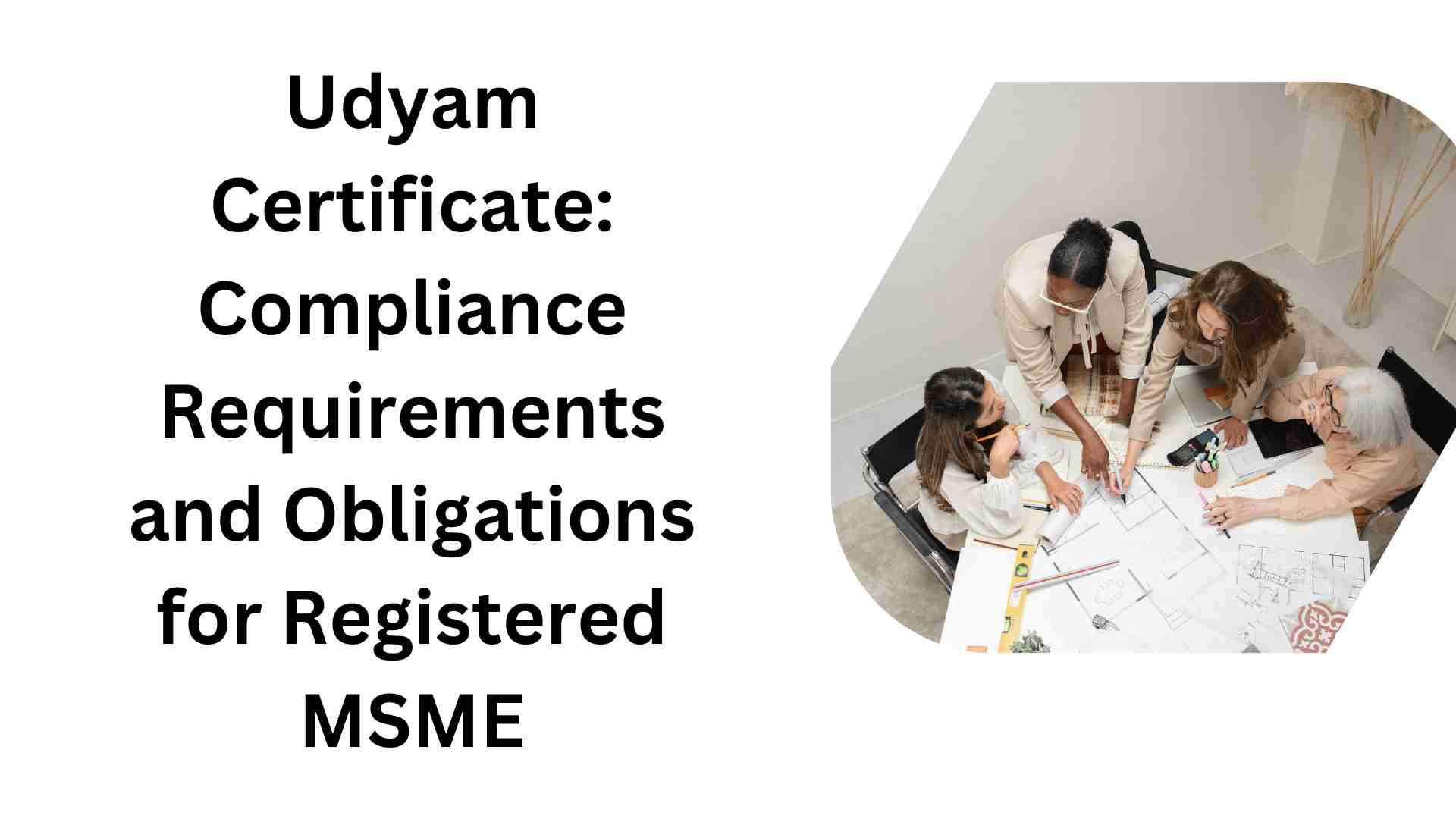
Udyam Certificate: Compliance Requirements and Obligations for Registered MSME
Udyam Registration is a simplified online process introduced by the Indian government for the registration of Micro, Small, and Medium Enterprises (MSMEs) in the country. It replaced the earlier system known as Udyog Aadhar Registration.
Udyam Certificate, introduced by the Indian government for Micro, Small, and Medium Enterprises (MSMEs), not only offers various benefits but also entails specific compliance requirements and obligations. Understanding these obligations is crucial for registered MSMEs to ensure they meet the necessary standards and maintain compliance with regulations.
Compliance Requirements and Obligations:
Periodic Update of Information:
Registered MSMEs are obligated to update their information regularly. This includes details about turnover, investment in plant & machinery or equipment, and other relevant business information. This update is necessary to reflect any changes in the enterprise’s status that might affect its classification under the MSME category.
Filing Annual Returns:
MSMEs registered with the Udyam Certificate need to file annual returns. These returns document the enterprise’s performance and are essential for maintaining transparency and compliance with regulatory requirements.
Adherence to Environmental Regulations:
Compliance with environmental regulations is crucial. MSMEs must ensure that their operations align with environmental standards and norms set by regulatory authorities to minimize their environmental impact.
Payment of Dues and Taxes:
Registered MSMEs must fulfill their financial obligations promptly. This includes timely payment of dues, taxes, and any other statutory payments to avoid penalties or legal issues.
Utilization of Benefits and Subsidies:
If an MSME avails of benefits, subsidies, or incentives offered by the government, it is obligated to utilize them for the intended purposes per the specified guidelines. Any misuse can lead to consequences and potential penalties.
Compliance with Labour Laws:
MSMEs must adhere to labor laws and regulations, ensuring fair employment practices, safety standards, and other legal requirements related to their workforce.
Maintaining Quality Standards:
Compliance with quality standards is pivotal for MSMEs holding Udyam Certificates. These enterprises must ensure their products or services meet the required quality benchmarks. Adherence to quality norms not only enhances customer satisfaction but also strengthens the enterprise’s reputation in the market.
Certifications and Standards:
MSMEs should strive to obtain relevant certifications such as ISO (International Organization for Standardization) certifications or other industry-specific standards. These certifications endorse the quality and reliability of products/services, facilitating better market acceptance.
Continuous Improvement:
Udyam-certified MSMEs should focus on continuous improvement in their operations, processes, and product/service offerings. Embracing innovative techniques and technologies can lead to enhanced efficiency and higher-quality outputs.
Financial Transparency and Reporting:
Maintaining financial transparency and accurate reporting is crucial for Udyam-certified MSMEs:
Bookkeeping and Accounting:
MSMEs should maintain proper bookkeeping and accounting records in compliance with accounting standards. This ensures financial transparency and facilitates accurate reporting for audits or assessments.
Timely Financial Statements:
Preparation and timely submission of financial statements, including balance sheets, profit & loss statements, and cash flow statements, are essential. These statements reflect the enterprise’s financial health and aid in decision-making processes.
Ethical Business Practices:
Adherence to ethical business practices is imperative for Udyam-certified MSMEs:
Fair Trade Practices:
Enterprises should conduct their business ethically, avoiding unfair trade practices such as price manipulation, misleading advertising, or anti-competitive behavior.
You can also update udyam certificate
Corporate Social Responsibility (CSR):
Udyam-certified MSMEs should contribute positively to society through CSR initiatives. Engaging in activities that benefit the community, environment, or society at large reflects a commitment to responsible business conduct.
Conclusion:
Udyam Certification brings numerous benefits to MSMEs but also imposes several compliance requirements and obligations. Ensuring compliance not only helps in meeting legal standards but also instills confidence among stakeholders, customers, and investors. Upholding quality standards, financial transparency, ethical business practices, and continuous improvement contribute to the sustainability and growth of MSMEs. It’s crucial for Udyam-certified MSMEs to view compliance not just as a regulatory necessity but as a strategic tool that enhances credibility, fosters growth, and solidifies their position in the market.


